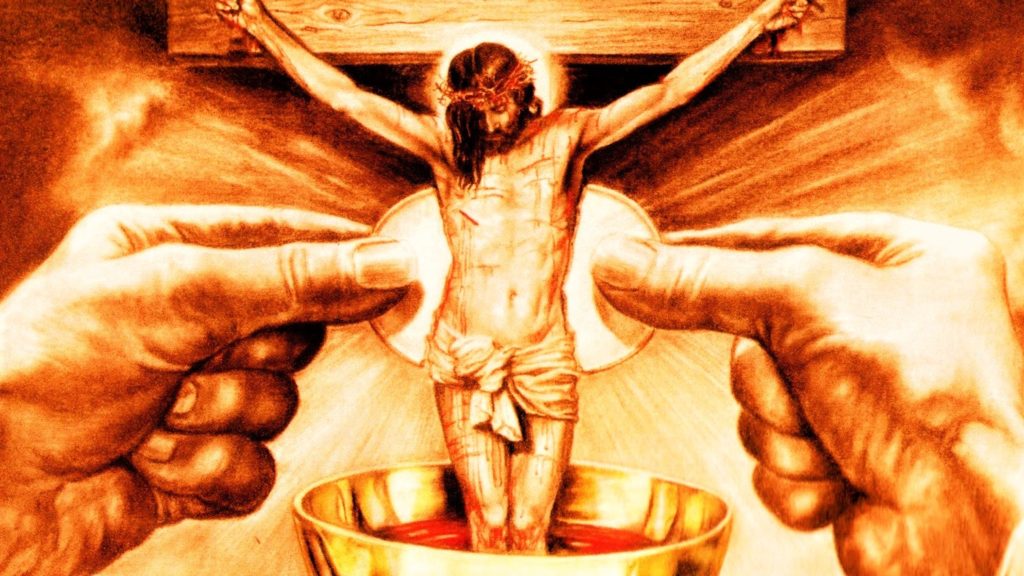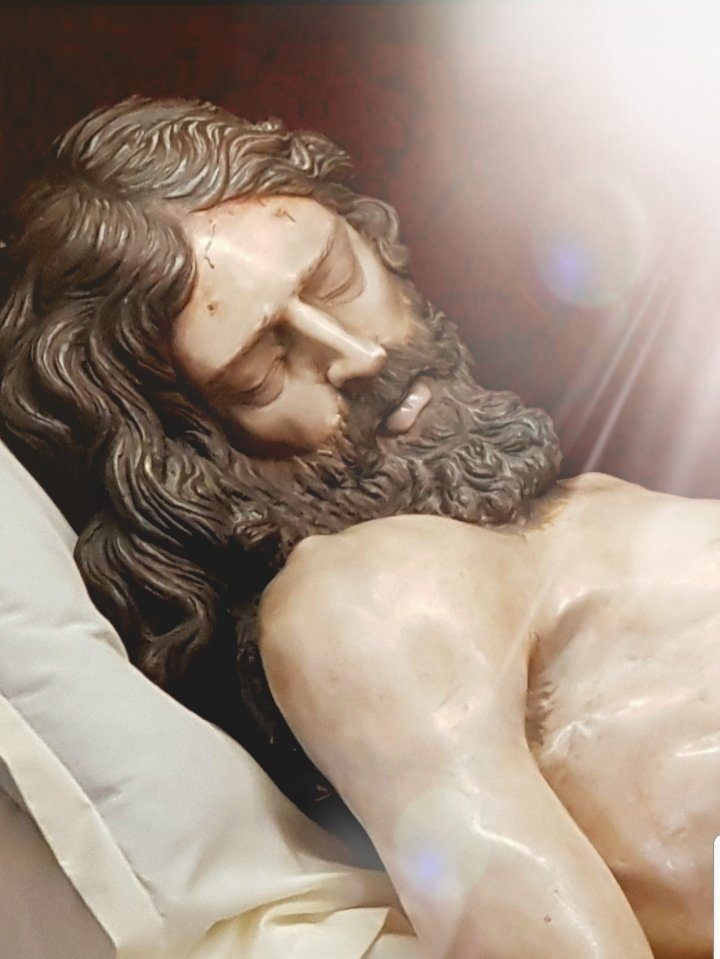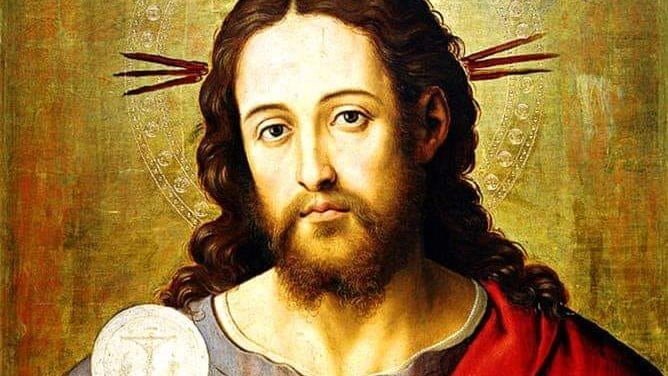Friday in the 3rd week of Easter
DAILY MASS, GOSPEL AND COMMENTARY:
“WHOEVER EATS MY FLESH AND DRINKS MY BLOOD HAS ETERNAL LIFE” (Jn 6:52-59).

READING I
Acts 9:1–20
Saul, still breathing murderous threats against the disciples of the Lord, went to the high priest and asked him for letters to the synagogues in Damascus, that, if he should find any men or women who belonged to the Way, he might bring them back to Jerusalem in chains. On his journey, as he was nearing Damascus, a light from the sky suddenly flashed around him. He fell to the ground and heard a voice saying to him, “Saul, Saul, why are you persecuting me?” He said, “Who are you, sir?” The reply came, “I am Jesus, whom you are persecuting. Now get up and go into the city and you will be told what you must do.” The men who were traveling with him stood speechless, for they heard the voice but could see no one. Saul got up from the ground, but when he opened his eyes he could see nothing; so they led him by the hand and brought him to Damascus. For three days he was unable to see, and he neither ate nor drank.
There was a disciple in Damascus named Ananias, and the Lord said to him in a vision, “Ananias.” He answered, “Here I am, Lord.” The Lord said to him, “Get up and go to the street called Straight and ask at the house of Judas for a man from Tarsus named Saul. He is there praying, and in a vision he has seen a man named Ananias come in and lay his hands on him, that he may regain his sight.” But Ananias replied, “Lord, I have heard from many sources about this man, what evil things he has done to your holy ones in Jerusalem. And here he has authority from the chief priests to imprison all who call upon your name.” But the Lord said to him, “Go, for this man is a chosen instrument of mine to carry my name before Gentiles, kings, and children of Israel, and I will show him what he will have to suffer for my name.” So Ananias went and entered the house; laying his hands on him, he said, “Saul, my brother, the Lord has sent me, Jesus who appeared to you on the way by which you came, that you may regain your sight and be filled with the Holy Spirit.” Immediately things like scales fell from his eyes and he regained his sight. He got up and was baptized, and when he had eaten, he recovered his strength.
He stayed some days with the disciples in Damascus, and he began at once to proclaim Jesus in the synagogues, that he is the Son of God.
RESPONSORIAL PSALM
R. Go out to all the world and tell the Good News.
Or: Alleluia.
Praise the Lord, all you nations;
glorify him, all you peoples!
R. Go out to all the world and tell the Good News.
Or: Alleluia.
For steadfast is his kindness toward us,
and the fidelity of the Lord endures forever.
R. Go out to all the world and tell the Good News.
Or: Alleluia.
ALLELUIA
Whoever eats my flesh and drinks my blood will live in me and I in him, says the Lord.
Gospel of Friday, 3rd week of Easter.
Jn 6:52-59
The Jews quarreled among themselves, saying, “How can this man give us his Flesh to eat?” Jesus said to them, “Amen, amen, I say to you, unless you eat the Flesh of the Son of Man and drink his Blood, you do not have life within you. Whoever eats my Flesh and drinks my Blood has eternal life, and I will raise him on the last day. For my Flesh is true food, and my Blood is true drink. Whoever eats my Flesh and drinks my Blood remains in me and I in him. Just as the living Father sent me and I have life because of the Father, so also the one who feeds on me will have life because of me. This is the bread that came down from heaven. Unlike your ancestors who ate and still died, whoever eats this bread will live forever.” These things he said while teaching in the synagogue in Capernaum.
GOSPEL COMMENTARY from the Navarre Bible, Commentary to the Gospel of St. John (with permission)
52 The Jews quarreled among themselves, saying, “How can this man give us his Flesh to eat?”
- Christ’s hearers understand perfectly well that he means exactly what he says; but they cannot believe that what he says could be true; if they had understood him in a metaphorical, figurative or symbolic sense there would be no reason for them to be so surprised and nothing to cause an argument. Later, Jesus reaffirms what he has said — confirming what they have understood him to say (cf. vv. 54-56).
53 “Amen, amen, I say to you, unless you eat the Flesh of the Son of Man and drink his Blood, you do not have life within you.
- Once again Jesus stresses very forcefully that it is necessary to receive him in the Blessed Eucharist in order to share in divine life and develop the life of grace received in Baptism. No parent is content to bring children into the world: they have to be nourished and looked after to enable them reach maturity.
- “We receive Jesus Christ in Holy Communion to nourish our souls and to give us an increase of grace and the gift of eternal life” (St Pius X, Catechism of Christian Doctrine, 289).
54 Whoever eats my Flesh and drinks my Blood has eternal life, and I will raise him on the last day.
- Jesus clearly states that his Body and Blood are a pledge of eternal life and a guarantee of the resurrection of the body. St Thomas Aquinas gives this explanation:
- “The Word gives life to our souls, but the Word made flesh nourishes our bodies. In this Sacrament is contained the Word not only in his divinity but also in his humanity; therefore, it is the cause not only of the glorification of our souls but also of that of our bodies” (Commentary on St John, in loc.).
- Our Lord uses a stronger word than just “eating” (the original verb could be translated as “chewing”) which shows that Communion is a real meal. There is no room for saying that he was speaking only symbolically, which would mean the Communion was only a metaphor and not really eating and drinking the Body and the Blood of Christ.
- “All these invitations, promises and threats sprang from the great desire which (Jesus) had of giving us himself in the holy sacrament of the altar.“But why should Jesus so ardently desire us to receive him in holy communion? It is because love always sighs for, and tends to a union with, the object beloved. True friends wish to be united in such a manner as to become only one. The love of God for us being immense, he destined us to possess him not only in heaven, but also here below, by the most intimate union, under the appearance of bread in the Eucharist. It is true we do not see him; but he beholds us, and is really present; yes, he is present in order that we may possess him and he conceals himself, that we may desire him, and until we reach our true homeland, Jesus Christ wishes in this way to be entirely ours, and to be perfectly united to us” (St Alphonsus Liguori, The love of our Lord Jesus Christ reduced to practice, chap. 2).
55 For my Flesh is true food, and my Blood is true drink.
- In the same way as bodily food is necessary for life on earth, Holy Communion is necessary for maintaining the life of the soul, which is why the Church exhorts us to receive this Sacrament frequently:
- “Every day, as is desirable, and in the greatest possible numbers, the faithful must take an active part in the sacrifice of the Mass, avail themselves of the pure, holy refreshment of Holy Communion and make a suitable thanksgiving in return for this great gift of Christ the Lord. Here are words they should keep in mind: ‘Jesus Christ and the Church desire all Christ’s faithful to approach the sacred banquet every day. The basis of this desire is that they should be united to God by the sacrament and draw strength from it to restrain lust, to wash away the slight faults of daily occurrence and to take precautions against the more serious sins to which human frailty is liable’ (Decree of the S.C. of the Council, 20 December 1905)” (Paul VI, Mysterium fidei).
- “The Saviour has instituted the most august Sacrament of the Eucharist, which truly contains his flesh and his blood, so that he who eats this bread may live forever; whosoever, therefore, makes use of it often with devotion so strengthens the health and the life of his soul, that it is almost impossible for him to be poisoned by any kind of evil affection. We cannot be nourished with this flesh of life, and live with the affections of death… Christians who are damned will he unable to make any reply when the just Judge shows them how much they are to blame for dying spiritually, since it was so easy for them to maintain themselves in life and in health by eating his Body which he had left them for this purpose. Unhappy souls, he will say, why did you die, seeing that you had at your command the fruit and the food of life?” (St Francis de Sales, Introduction to the Devout Life, part II, chap. 20, 1).
56 Whoever eats my Flesh and drinks my Blood remains in me and I in him.
- The most important effect of the Blessed Eucharist is intimate union with Jesus Christ. The very word “communion” suggests sharing in the life of our Lord and becoming one with him; if our union with Jesus is promoted by all the Sacraments through the grace which they give us, this happens more intensely in the Eucharist, for in it we receive not only grace but the very Author of grace:
- “Really sharing in the body of the Lord in the breaking of the eucharistic bread, we are taken up into communion with him and with one another. ‘Because the bread is one, we, though many, are one body, all of us who partake of the one bread’ (1 Cor 10:17)” (Vatican II, Lumen gentium, 7).
- Precisely because the Eucharist is the sacrament which best signifies and effects our union with Christ, it is there that the whole Church manifests and effects its unity: Jesus Christ ‘instituted in his Church the wonderfu1 sacrament of the Eucharist, by which the unity of the Church is both signified and brought about” (Vatican II, Unitatis redintegratio, 2).
57 Just as the living Father sent me and I have life because of the Father, so also the one who feeds on me will have life because of me. This is the bread that came down from heaven.
- In Christ, the Incarnate Word sent to mankind, “the whole fullness of deity, dwells bodily” (Col 2:9) through the ineffable union of his human nature and his divine nature in the Person of the Word. By receiving in this sacrament the Body and Blood of Christ indissolubly united to his divinity, we share in the divine life of the Second Person of the Blessed Trinity. We will never be able to appreciate enough the intimacy with God himself — Father, Son and Holy Spirit — that we are offered in the eucharistic banquet.
- “We can therefore do nothing more agreeable to Jesus Christ than to go to Communion with the dispositions suitable to so great an action, since we are then united to Jesus Christ, according to the desire of this all-loving God. I have said with ‘suitable’ and not ‘worthy’ disposition, for who could communicate if it was necessary to be worthy of so great a Saviour? No one but a God would be worthy to receive a God. But by this word suitable, or convenient, I mean such a disposition as becomes a miserable creature, who is clothed with the unhappy flesh of Adam. Ordinarily speaking, it is sufficient that we communicate in a state of grace and with an anxious desire of advancing in the love of Jesus Christ” (St Alphonsus Liguori, The love of our Lord Jesus Christ reduced to practice, chap. 2).
58 Unlike your ancestors who ate and still died, whoever eats this bread will live forever.”
- For the third time (cf. 6:31-32 and 6:49) Jesus compares the true bread of life, his own Body, with the manna God used to feed the Israelites every day during their forty years in the wilderness — thereby, inviting us to nourish our soul frequently with the food of his Body.
- “Going to Communion every day for so many years! Anybody else would be a saint by now, you told me, and I… I’m always the same! “Son, I replied, keep up your daily Communion, and think: what would I be if I had not gone” (St. Josemaria, The Way, 534).
VIDEO REFLECTION TOPIC: ARE YOU A SAUL OR AN ANANIAS TO OTHERS?
In today’s first reading, we read one of the major turning points in the life of the early Christian community and the development of the Church centuries hence.
Saul was on his way to Damascus, a distance of 250 km or 150 miles north of Jerusalem – a journey of four to six days – to arrest Christians and bring them back to Jerusalem to be imprisoned and even put to death.
Saul meets Jesus, had his powerful conversion experience, becomes blind for three days. Ananias, upon instructions from the Lord, visits Saul and prays over him.
We are both Saul and Ananias to others.
Stay updated: subscribe by email for free TO OUR NEW WEBSITE www.catholicsstrivingforholiness.org (PUT YOUR EMAIL IN THE SUBSCRIBE WIDGET).
We are also in www.fb.com/Catholicsstrivingforholiness. Kindly help more people in their Christian life by liking our page and inviting your family, friends and relatives to do so as well. Thanks in advance and God bless you and your loved ones! Fr. Rolly Arjonillo

